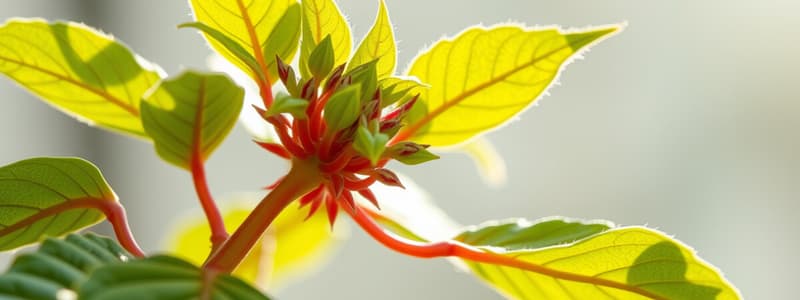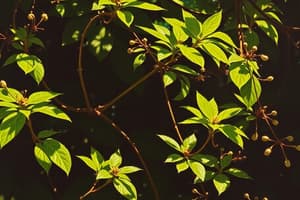Podcast
Questions and Answers
Is this organelle more likely to be found in animal cells or plant cells?
Is this organelle more likely to be found in animal cells or plant cells?
- Plant cells (correct)
- Animal cells
What compound necessary for photosynthesis is contained in the thylakoids?
What compound necessary for photosynthesis is contained in the thylakoids?
Chlorophyll
What substances are the reactants in photosynthesis? Include the name and chemical formula of each substance in your answer.
What substances are the reactants in photosynthesis? Include the name and chemical formula of each substance in your answer.
Carbon dioxide - CO₂ and Hydrogen dioxide - H₂O
Where in the organelle are these molecules stored before they are used in photosynthesis?
Where in the organelle are these molecules stored before they are used in photosynthesis?
Is photosynthesis an endergonic or exergonic reaction? Support your answer with evidence from Model 1.
Is photosynthesis an endergonic or exergonic reaction? Support your answer with evidence from Model 1.
What is the energy source for photosynthesis?
What is the energy source for photosynthesis?
What is another name for the light-independent reactions?
What is another name for the light-independent reactions?
In what part of the chloroplast do the light-dependent reactions occur?
In what part of the chloroplast do the light-dependent reactions occur?
In what part of the chloroplast do the light-independent reactions occur?
In what part of the chloroplast do the light-independent reactions occur?
What compound is best able to absorb the light energy from the sun and convert it into chemical energy?
What compound is best able to absorb the light energy from the sun and convert it into chemical energy?
What substances are produced during photosynthesis? Include the name and chemical formula of each substance in your answer.
What substances are produced during photosynthesis? Include the name and chemical formula of each substance in your answer.
Why is it necessary to have six CO₂ entering the chloroplast?
Why is it necessary to have six CO₂ entering the chloroplast?
In Model 2, what shape or symbol represents a single electron?
In Model 2, what shape or symbol represents a single electron?
Find two places in Model 2 where electrons are released from chlorophyll by a photon of light.
Find two places in Model 2 where electrons are released from chlorophyll by a photon of light.
Find one place in Model 2 where electrons are released from water molecules.
Find one place in Model 2 where electrons are released from water molecules.
When electrons are released from water molecules, what other products are formed?
When electrons are released from water molecules, what other products are formed?
In Model 2, label the diagram with 'A', 'B', and 'C' to indicate where the three steps occur.
In Model 2, label the diagram with 'A', 'B', and 'C' to indicate where the three steps occur.
The light-dependent reactions include an electron transport chain system. Briefly describe how this system works.
The light-dependent reactions include an electron transport chain system. Briefly describe how this system works.
Name the embedded protein complex found in the thylakoid membrane that reduces NADP+ into NADPH.
Name the embedded protein complex found in the thylakoid membrane that reduces NADP+ into NADPH.
Name the embedded protein complex found in the thylakoid membrane that uses excited electrons for the electron transport chain.
Name the embedded protein complex found in the thylakoid membrane that uses excited electrons for the electron transport chain.
Name the embedded protein complex found in the thylakoid membrane that uses excited electrons.
Name the embedded protein complex found in the thylakoid membrane that uses excited electrons.
Once a chlorophyll molecule has released electrons, what is the source of replacement electrons for those released from photosystem I?
Once a chlorophyll molecule has released electrons, what is the source of replacement electrons for those released from photosystem I?
What is the source of replacement electrons for those released from photosystem II?
What is the source of replacement electrons for those released from photosystem II?
Is carbon dioxide involved in light-dependent reactions?
Is carbon dioxide involved in light-dependent reactions?
Are any of the 12 water molecules products of the light-dependent reactions?
Are any of the 12 water molecules products of the light-dependent reactions?
Where do the ATP and NADPH produced during the light-dependent reactions go when the process is complete?
Where do the ATP and NADPH produced during the light-dependent reactions go when the process is complete?
What are the three phases of the Calvin cycle?
What are the three phases of the Calvin cycle?
Explain what happened to the carbon atoms from the carbon dioxide molecules that entered the Calvin cycle.
Explain what happened to the carbon atoms from the carbon dioxide molecules that entered the Calvin cycle.
What is carbon fixation?
What is carbon fixation?
What molecule does the PGA molecule turn into during the reduction phase of the Calvin cycle?
What molecule does the PGA molecule turn into during the reduction phase of the Calvin cycle?
Describe how the structures if the PGA and PGAL are different.
Describe how the structures if the PGA and PGAL are different.
Identify types and numbers of molecules that provide the free energy necessary for the reduction of the PGA molecule.
Identify types and numbers of molecules that provide the free energy necessary for the reduction of the PGA molecule.
How many water molecules are produced in the reduction phase of the Calvin cycle?
How many water molecules are produced in the reduction phase of the Calvin cycle?
In the reduction phase of the Calvin cycle, explain where the hydrogen and oxygen atoms in these water molecules originated.
In the reduction phase of the Calvin cycle, explain where the hydrogen and oxygen atoms in these water molecules originated.
How many PGAL molecules will it take to make one molecule of glucose?
How many PGAL molecules will it take to make one molecule of glucose?
How many turns of the Calvin cycle will it take to make one molecule of glucose?
How many turns of the Calvin cycle will it take to make one molecule of glucose?
Where do the ADP and NADP+ go after they are used in the Calvin cycle?
Where do the ADP and NADP+ go after they are used in the Calvin cycle?
How do the light-dependent and light-independent reactions depend on each other?
How do the light-dependent and light-independent reactions depend on each other?
Throughout photosynthesis, energy is transferred from light to several molecules increasingly higher potential energy.
Throughout photosynthesis, energy is transferred from light to several molecules increasingly higher potential energy.
Flashcards are hidden until you start studying
Study Notes
Photosynthesis Overview
- Photosynthesis occurs primarily in plant cells, specifically in chloroplasts.
- The key structures for this process include thylakoids, which contain chlorophyll.
Reactants and Products
- Primary reactants: Carbon dioxide (CO₂) and water (H₂O).
- Stored in the stroma of chloroplasts prior to use in photosynthesis.
- Photosynthesis is an exergonic reaction, releasing energy into the plant cell.
- Energy source: Sunlight.
- Key products: Glucose (C₆H₁₂O₆), oxygen (O₂), and water (H₂O) generated during the process.
Light-dependent and Light-independent Reactions
- Light-independent reactions are also known as the Calvin cycle.
- Light-dependent reactions occur in the thylakoid membranes, while the Calvin cycle occurs in the stroma.
- Chlorophyll is crucial for absorbing sunlight and converting it into chemical energy.
Electron Transport
- Electrons are released from chlorophyll molecules when exposed to sunlight, happening in photosystems I and II.
- Water molecules split, releasing electrons, protons (H⁺), and oxygen (O₂) in the process, specifically within the inner thylakoid space.
- An electron transport chain assists in moving electrons against a concentration gradient, producing ATP.
Protein Complexes in Thylakoids
- Photosystem I reduces NADP+ to NADPH using excited electrons.
- Photosystem II delivers excited electrons to the electron transport chain.
- ATP synthase utilizes energy from excited electrons to produce ATP.
Function of Water in Photosynthesis
- Twelve water molecules used as reactants result in the release of six water molecules as products, with no water produced during light-dependent reactions.
The Calvin Cycle Phases
- The three phases of the Calvin cycle: Carbon fixation, reduction, and regeneration.
- Carbon fixation involves incorporating carbon from CO₂ into larger plant molecules, specifically changing it into PGA.
- PGA is converted into PGAL during the reduction phase, requiring energy from ATP and NADPH.
Water Production in the Calvin Cycle
- Six water molecules produced during the reduction phase, with oxygen derived from PGA and hydrogen from NADPH.
Glucose Synthesis
- Two PGAL molecules are needed to synthesize one glucose molecule, necessitating one turn of the Calvin cycle.
- ADP and NADP+ return to the thylakoid for recycling during light-dependent reactions.
Dependency Relationship
- The Calvin cycle requires ATP and NADPH generated from light-dependent reactions, highlighting their interdependence throughout the photosynthesis process.
Studying That Suits You
Use AI to generate personalized quizzes and flashcards to suit your learning preferences.



